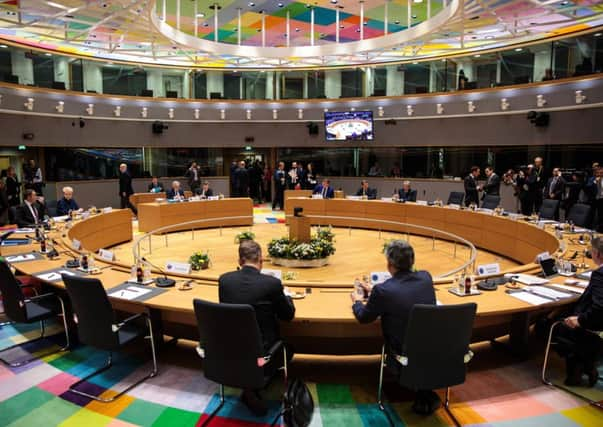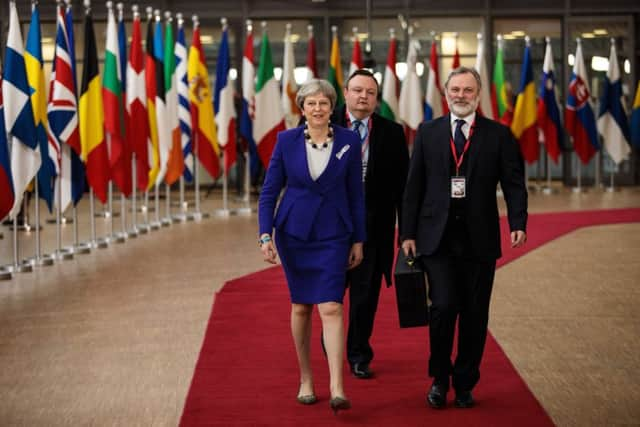Brexit: 10 big questions needing answered on Britain's exit


If the past year has been about settling the divorce, the next year will focus on “who gets the stuff” – the access to each other’s markets and the level of co-operation in key areas like security and research. What still has to be sorted out before Brexit day?
1 Customs & Trade
With full trade talks set for the transition, the goal is a “political agreement” on broad principles by the autumn. What sort of customs arrangements this will point to: the frictionless “customs agreement” preferred by London, or a patchwork of measures borrowed from places like the US-Canada and Sweden-Norway borders? In the meantime, can the UK build the infrastructure for whatever the new reality is on the border the day after the transition ends, on 31 December 2020?


2 Immigration
Advertisement
Hide AdAdvertisement
Hide AdMuch depends on the effectiveness of Home Office systems to process “settled status” applications from 3 million Europeans living in Britain. Attention also turns to the future immigration system, with legislation and a policy review still to set out whether EU citizens will have preference over those arriving from the rest of the world. Will net migration from the EU, halved since the referendum, continue to fall, with consequences for the economy and public services?


3 Justice & security
Building a “new relationship on security” while withdrawing from EU foreign policy decision-making will be challenging, as the lack of UK opposition opens the door to greater military integration and the removal of foreign policy vetos in Brussels. The US fears a post-Brexit economic hit could further erode military capabilities. Co-operation on justice after Brexit hangs in the balance; the outgoing British head of Europol warns that despite its big contribution on intelligence, the UK will not enjoy the same level of access to joint systems.
4 Scotland & devolution
A deal on devolution of powers after Brexit was expected before Christmas. It now looks increasingly unlikely. Scotland and Wales have passed continuity bills challenging Westminster’s authority over responsibilities in devolved areas returning from Brussels. Without a deal by the end of May, when the Lords must pass the EU Withdrawal Bill, the row looks set to end up in the Supreme Court. Even if a deal is done on which powers are devolved, months of wrangling will follow over “joint frameworks” to manage shared powers.
5 Northern Ireland
The Irish border could still derail the entire Brexit process. Neither Dublin nor Brussels are satisfied with technological solutions to avoid a “hard border” between Northern Ireland and the Republic. Without agreement by June, the “fallback” option agreed in December of “full alignment” across a range of policy areas risks collapsing the government, damaging the peace process and threatening the Union.
6 Health & the NHS
Immediate questions for the NHS and social care are tied to immigration, with health providers heavily reliant on recruitment from the EU. The UK’s bid to keep the European health insurance card (EHIC) has been kicked into the second phase of talks. Longer term issues such as the UK’s ability to influence European and global medecines regulation, and how much private sector access to NHS procurement will be granted in trade talks with third countries, will emerge over the coming year and beyond.
7 Financial services
Financial services firms are relying on the UK’s trade deal with the EU to cover their sector to an unprecedented degree, but Brussels has ruled out this approach, with France, one of the countries that stands to gain from companies moving operations out of the UK, standing firm. A key question is what direction the UK takes on regulation after Brexit: deregulation means less access to the EU market.
8 Education & science
Immigration decisions will be key to the higher education sector, not just in terms of keeping hold of EU students and staff, but also because free movement is tied to whether the UK will be able to continue participating in European programmes that pump billions into British science and research.
9 Environment
Michael Gove is determined to deliver a “Green Brexit”, but critics say the government’s 25-year plan on environmental regulation doesn’t offer the same guarantees as existing EU rules. Beyond the debate about whether trade deals will open the door to chlorine-washed chicken and hormone-injected beef, the key question is on enforcement: will UK agencies and courts be ready to be the watchdog on everything from food standards to air pollution?
10 Farming and fishing
Advertisement
Hide AdAdvertisement
Hide AdAfter the disappointment of a transition deal that keeps them tied to CFP rules until 2021, the fishing industry wants written guarantees that guaranteed access for EU fishing fleets won’t be traded in wider talks on the future relationship. Agriculture would be the worst affected by WTO tariffs if there is no trade deal, but farm prices could also fall if the UK takes a unilateral “zero tariff” approach, as some Brexiteers want. Farmers also await detail of Mr Gove’s new farm subsidies regime; doing away with the basic payment in favour of an environment-focused scheme would hit livestock farmers in Scotland hardest. Will farm payments in Scotland be subject to the Barnett Formula, potentially slashing the amount of money on offer? And will problems in the food sector in finding enough labour continue to worsen?
